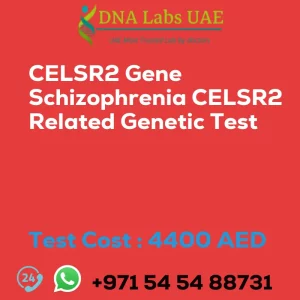SACS Gene Spastic Ataxia Charlevoix-Saguenay Type Genetic Test
Are you or a loved one experiencing symptoms of spastic ataxia Charlevoix-Saguenay (SACS)? DNA Labs UAE offers a comprehensive genetic test to help diagnose this rare neurological disorder. In this blog, we will discuss the symptoms, diagnosis process, and the cost of the SACS gene spastic ataxia Charlevoix-Saguenay type genetic test.
Symptoms of Spastic Ataxia Charlevoix-Saguenay
Spastic ataxia Charlevoix-Saguenay (SACS) is characterized by progressive muscle stiffness (spasticity) and impaired coordination (ataxia). Individuals with SACS may experience difficulty walking, muscle weakness, speech problems, and tremors. The symptoms usually appear in childhood or adolescence and worsen over time.
Diagnosis Process
If you suspect that you or a family member may have SACS, it is important to consult a neurologist. The diagnosis of SACS is confirmed through a genetic test called the SACS gene spastic ataxia Charlevoix-Saguenay type genetic test. This test uses Next-Generation Sequencing (NGS) technology to analyze the SACS gene for any variations or mutations that may be causing the disease.
Test Details
The SACS gene spastic ataxia Charlevoix-Saguenay type genetic test is conducted using a blood sample or extracted DNA. Alternatively, a single drop of blood on an FTA card can also be used. The test is performed in the genetics department and the results are delivered within 3 to 4 weeks.
NGS technology is used to sequence the entire coding region of the SACS gene, allowing for the identification of any mutations or variations. This information is crucial in confirming a diagnosis of spastic ataxia Charlevoix-Saguenay and determining the appropriate management strategies and prognosis for affected individuals.
Cost of the Test
The SACS gene spastic ataxia Charlevoix-Saguenay type genetic test is priced at 4400.0 AED.
Pre-Test Information
Prior to undergoing the SACS gene spastic ataxia Charlevoix-Saguenay type genetic test, it is recommended to provide the clinical history of the patient. Additionally, a genetic counseling session may be conducted to draw a pedigree chart of family members affected by SACS. This information aids in the interpretation of the test results and helps individuals and their families make informed decisions about their healthcare.
Conclusion
If you suspect that you or a loved one may have spastic ataxia Charlevoix-Saguenay, it is important to consult a neurologist who can order the SACS gene spastic ataxia Charlevoix-Saguenay type genetic test. This test can confirm a diagnosis, provide information about the prognosis, and guide appropriate management strategies. Genetic counseling is recommended to understand the implications of the test results and make informed decisions about healthcare.
Don’t delay in seeking a diagnosis. Contact DNA Labs UAE today to schedule a consultation and learn more about the SACS gene spastic ataxia Charlevoix-Saguenay type genetic test.
| Test Name | SACS Gene Spastic ataxia Charlevoix-Saguenay type Genetic Test |
|---|---|
| Components | |
| Price | 4400.0 AED |
| Sample Condition | Blood or Extracted DNA or One drop Blood on FTA Card o |
| Report Delivery | 3 to 4 Weeks |
| Method | NGS Technology |
| Test type | Neurological Disorders |
| Doctor | Neurologist |
| Test Department: | Genetics |
| Pre Test Information | Clinical History of Patient who is going for SACS Gene Spastic ataxia Charlevoix-Saguenay type NGS Genetic DNA Test A Genetic Counselling session to draw a pedigree chart of family members affected with SACS Gene Spastic ataxia Charlevoix-Saguenay type |
| Test Details |
SACS gene spastic ataxia Charlevoix-Saguenay type NGS genetic test is a diagnostic test used to detect mutations in the SACS gene. This gene is associated with a rare neurological disorder called spastic ataxia Charlevoix-Saguenay (SACS), which is characterized by progressive muscle stiffness (spasticity) and impaired coordination (ataxia). NGS stands for Next-Generation Sequencing, a high-throughput technology used to analyze multiple genes simultaneously. This test involves sequencing the entire coding region of the SACS gene to identify any variations or mutations that may be causing the disease. By identifying mutations in the SACS gene, this test can confirm a diagnosis of spastic ataxia Charlevoix-Saguenay and help determine the prognosis and appropriate management strategies for affected individuals. It can also be used for carrier testing and prenatal diagnosis in families with a known SACS gene mutation. It is important to note that this test is typically ordered by a healthcare provider, such as a geneticist or neurologist, and the results should be interpreted in conjunction with the individual’s clinical presentation and family history. Genetic counseling is often recommended to help individuals and their families understand the implications of the test results and make informed decisions about their healthcare. |








